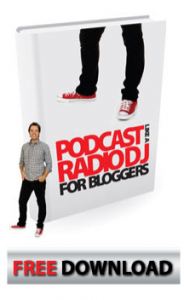It’s easy to think that a good microphone will get you quality audio, and forget about things like environmental factors. So in today’s post I’d like to go through some of the problems I’ve had with my own sound due to my recording environment – and what I did about them.
1. High ceilings and floorboards
In my last rental house – my recording studio was in the second bedroom. As well as being my spare room, study, sons nursery, this room had enormously high ceilings, the kind that were so high that they created a mega echo (it was so bad I could have a conversation with myself!)
This echo effect was caused by the sound waves bouncing around off the high ceilings and floorboards. The end result sounded like I was in a cave.
Here’s what I did about it:
I bought a great big old rug and slapped it on the floor.It was the soft fibres of the rug that absorbed the sound and stopped it from bouncing off the floor and reverberating around the rest of the room.
TIP: The harder the surfaces and furnishings in the room – the more reverb or echo you’ll get. eg. wooden floors, tables, glass desks etc.
I’ve also heard (and don’t laugh) that pot plants (the plants in the pot, not the pot plants that are illegal :)) can help absorb and deaden the sound.
Because it was only a rental property, there wasn’t much I could do about the high ceiling, but a technique that Jason Van Orden told me he used (and one I’ve done myself many years ago), was recording underneath a thick blanket.
Like the rug, the blanket acts as an absorber of the sound and prevents it from bouncing around. Although I did have to come up for air every 5 mins or so 🙂
If you have a bit more of a budget you may want to consider investing in something like acoustic tiles. I recently bought six tiles off ebay for around $45. I then just stuck them on the wall to help deaden the sound and they worked very well indeed.
You can get these from Ebay or a large musical store for quite a good price.
2. Windows
If you live next door to a 6 lane highway or just a neighbour who decides to crank out their chainsaw on the weekend for a garden blitz, then you’re probably wondering how to kill that noise coming in from outside.
Firstly, it’s important to understand how this noise gets to you.
Generally speaking windows are the biggest culprit. Glass is an incredibly good conduit for sound which makes recording in any room with big windows a real pain. Outside of boarding them up, here’s what you can do.
1. Consider getting your window double glazed. Double glazing means adding another pane of glass to an existing window and trapping still air in between those panes. It’s a technique that will help insulate your home from the cold / heat and excess noise. Watch this video to see what I’m talking about
However coming from Australia, I know that double glazing can be a very expensive option (more so than European countries) so here’s what you do….
2. Get some thick curtains and hang them over the window. And by thick, I mean “do yourself a back injury” thick. These will absorb the noise that’s getting through the window well and should reduce it dramatically before it reaches your microphone.
Or your other option is…
3. Get a room divider. You can get room dividers from second hand dealers or weekend markets.
In fact there used to be a second hand furniture shop just down the round from me in Melbourne. He had a bunch of old office dividers that he was trying to flog for about $50.
These things are perfect – just position in front of the window and you’ll be amazed at how much it reduces external noise. For extra sound proofing you could throw a blanket or duvet over the top.
I’d love to know what you’ve done to help reduce that pesky noise in your recording environment — leave a comment below!






